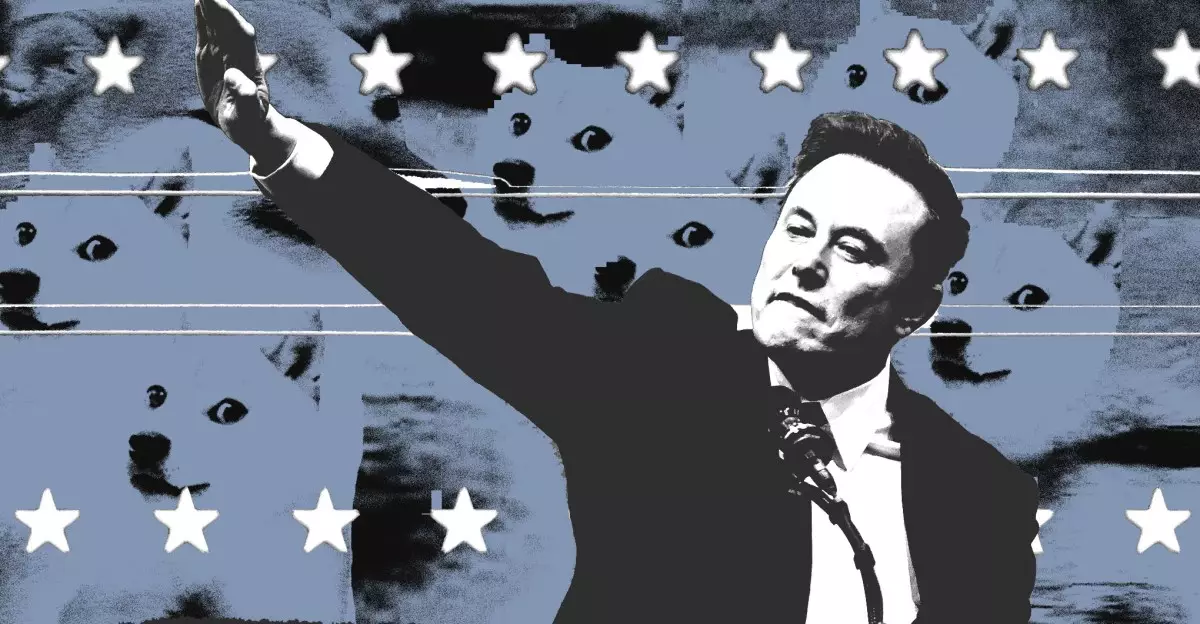In an era where social media serves as a double-edged sword—offering both a platform for genuine discourse and breeding grounds for toxic ideologies—Marko Elez’s case encapsulates a troubling intersection between governmental roles and extremist beliefs. Recently, Elez drew attention, not for his policy contributions, but for the alarming views echoed by his social media presence, notably through an account linked with posts advocating for a “eugenic immigration policy” and a repeal of the Civil Rights Act. As a policy reporter with a background steeped in immigration politics and sociopolitical movements, examining the fallout from this scenario provides insight into broader ideological shifts occurring within government ranks.
Elez’s resignation from the Department of Government Efficiency (DOGE) illustrates a growing intersection of far-right sentiments with official governmental roles. Initially employed to streamline federal operations under the banner of then-newly appointed Elon Musk, Elez was entangled in controversies surrounding his past. This case isn’t merely an isolated incident but reflects a concerning trend, wherein ideological extremism disrupts the established norms of civil service.
While the DOGE’s mandate claimed to focus on efficiency, its initiatives appeared to target diversity, equity, and inclusion (DEI) measures, often maligning them as components of a so-called “woke agenda.” Here, we see a pattern of hostility towards policies designed to promote inclusivity, raising vital questions about the ideological foundations steering government practices. The language used by Elez—a disregard for human value in favor of a distorted sense of “efficiency”—mirrors rhetoric often adopted by white nationalist circles, marking a troubling convergence of governance and extremist thought.
The role of social media in exposing Elez’s views cannot be understated. Platforms like X (formerly Twitter) have created pathways for extremist rhetoric to gain visibility, fueling the normalization of previously fringe beliefs within mainstream political discourse. Elez’s now-deleted account (@nullllptr), chronicling disdainful comments about the H-1B visa process and promoting the deluded notion that artificial intelligence could replace skilled workers, underscores the perilous potential of social media as a breeding ground for harmful ideologies.
Such incidents provoke reflection on societal ramifications. When officials harbor and express radical ideas openly, they risk influencing legislative frameworks, which could reverberate through policies impacting millions of lives. The normalization of views aligned with eugenics and racism, even as whispers among fringe groups, should alarm stakeholders across the spectrum—policy makers, civil rights advocates, and everyday citizens alike.
A Wider Network of Ideological Extremism
Further complicating the narrative is the emergence of figures like Darren Beattie, another government staff member with controversial ties. His ideology, unapologetically advocating for a return to the dominance of “competent white men,” disrupts the existing power dynamic, raising red flags about the future trajectory of policy-making under such ideologies. The overt efforts to dismantle DEI programs championed by minorities and marginalized groups amplify the need for vigilance as extremist views gain traction within established governmental trajectories.
The phenomenon described by writer John Ganz, termed “groyperfication,” points to a larger cultural shift among young conservatives who navigate an increasingly online landscape where troubling ideas proliferate unchecked. The emergence of this digital ecosystem illustrates how echo chambers can distort perceptions of reality, leading to acceptance of extreme measures and a marginalization of fundamental civil rights with dangerous implications.
Marko Elez’s story serves as a crucial focal point for reassessing not only the integrity of civil service but also the ideological underpinnings that shape policy. As socio-political battles over immigration and civil rights intensify, the need to cultivate an inclusive and diverse government grows ever more apparent. The implications of Elez’s views, which once seemed relegated to the shadows, now threaten to breach the formal structures of governance.
The intersection of social media, ideology, and governmental roles warrants further examination to safeguard democracy and civil rights. As the specter of extremist thoughts emerges, ensuring that civil service remains a bastion of inclusiveness, equity, and integrity stands as an immediate imperative for all civic-minded citizens. The ongoing dynamic demands proactive engagement, thoughtful discourse, and relentless advocacy for fundamental rights as we navigate these treacherous waters.

